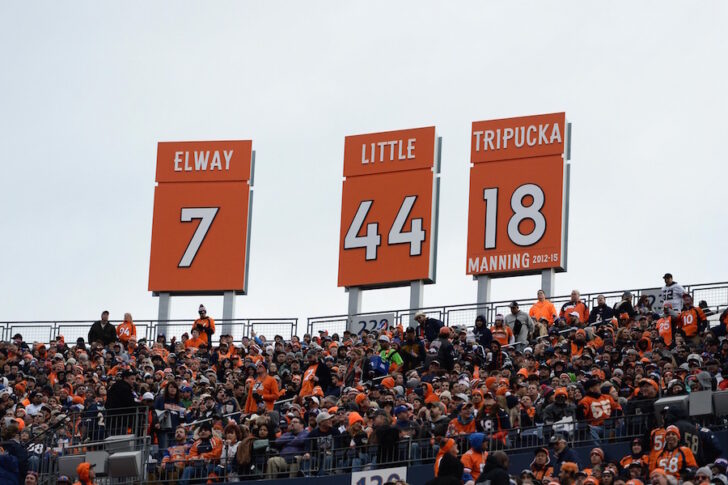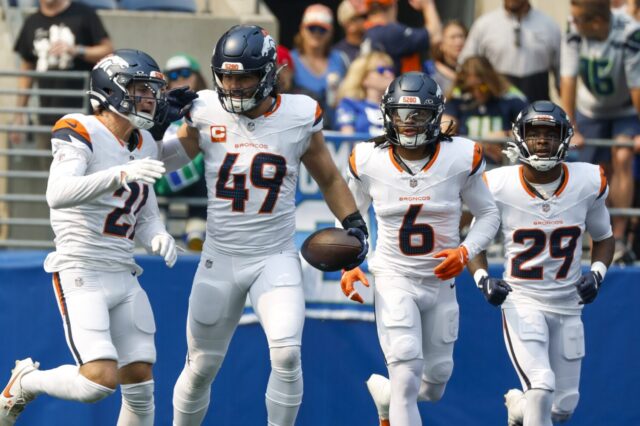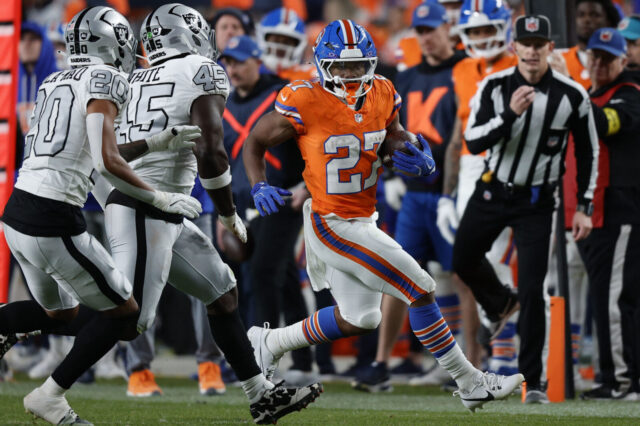The sports world turned its eyes to New York on Sunday night to see one of the all-time great New York Yankees, Derek Jeter, have his number retired by the iconic franchise. Jeter became the latest in a long line of Bronx heroes to have his number put to rest – fitting for a player who averaged nearly 138 games per season over 20 years in Major League Baseball.
Jeter’s accolades are too numerous to list for these purposes, but they include 14 All-Star appearances, five Gold Gloves, five Silver Sluggers and five World Championships. He captained the Yankees through the great franchise’s turn-of-the-century renaissance and will be a guaranteed first-ballot Hall of Famer. He is the class of sports over the past decade, comparable only to names like Bryant, James and Manning over the past two decades.
Peyton Manning is perhaps the closest comparison that can be made during their era, as both men not only excelled on the field, but also conducted themselves with class and as faces of their sport off it.
No player in Denver sports over the last 20 years even comes close to a comparison with Jeter and Manning, but that doesn’t mean that there aren’t still some incredible athletes to have come through the Mile High City during that time – many of which may be deserving of having their numbers permanently retired.
In this series, we look at which current or former Colorado athletes are the closest to having their jersey retired, and why they may or may not see their numbers hanging in the rafters in the years to come.
Denver Broncos
Over their 58 seasons, the Denver Broncos have seen six players who have donned the orange and blue go on to proudly wear the gold jacket reserved for players enshrined in the Pro Football Hall of Fame. A seventh is coming this summer when Terrell Davis joins the illustrious group, and a ninth is sure to be added to that list the moment Peyton Manning is eligible in 2021. The team has won three Super Bowls and eight AFC titles and had countless players on Pro Bowl and All-Pro rosters. Still, only three numbers have ever been set aside by the team as permanently off limits. Tripucka’s 18 (shared for four years with Manning at Tripucka’s blessing), Floyd Little‘s 44 and John Elway‘s 7 rise above the South Stands, never to be worn in orange and blue again.
Given the franchise’s longtime success – especially under Pat Bowlen’s leadership – it seems a bit strange that the Broncos have only three numbers permanently retired. Even more strange, perhaps, is that one of them belongs to Tripucka, who is not a member of the Pro Football Hall of Fame. Still, the list of possible candidates to be the next number permanently retired is both long and short.
It’s long because there are countless great Broncos through the years who by many standards in Denver should have their numbers retired. It’s short because the Broncos are unlike any other team in Denver. In 21 seasons in the Mile High City, the Avalanche have retired five jerseys. That goes to show just how difficult it is to be immortalized at the highest level with the Broncos.
So who are the top candidates to join Elway, Little, Tripucka (and Manning)? The logical first choice is the aforementioned Terrell Davis, who is finally getting his due in Canton this August. Although his career was cut short by injury, he was arguably the best player in the NFL during Denver’s back-to-back Super Bowl seasons. Beyond the raw statistics, Davis did something no other player – even the immortal Elway – was capable of doing. He won a Super Bowl. Yes, Elway and other Broncos greats like Shannon Sharpe, Rod Smith, Alfred Williams and Tom Nalen were major factors in that first world championship. But Davis’ MVP-earning performance in Super Bowl XXXII broke the Broncos’ run of four consecutive losses in the NFL title game. That first win opened the gates for a win the following year and eventually helped set the stage for Elway’s return to the franchise and another world title in 2015. Without No. 30, there’s a good chance the lobby at Dove Valley would still be without a Lombardi Trophy.
After Davis is Shannon Sharpe, who in addition to his two rings in Denver also picked one up with the Baltimore Ravens. Sharpe earned his gold jacket in 2011 and remains a prominent figure on the NFL scene as a national television personality. As a tight end, Sharpe ranks second in franchise history in yards, receptions and touchdowns. While Davis was the motor behind the back-to-back Super Bowl winning teams, Sharpe was the mouth. Never afraid to speak his mind, Sharpe was a vocal leader on a team full of big, boisterous personalities. His interminable will to win played a huge role in Denver’s success over the years. And one thing that is often overlooked with Sharpe’s career is that he returned to Denver for the final two years of his career to try and help the Broncos return to the promised land. The Broncos came up short both years, but it says a lot that Sharpe cared so much about the franchise and winning with the Broncos that No. 84 was willing to return for the 13th and 14th years of his NFL career.
The final candidate, and perhaps a dark horse one at that, is Champ Bailey. The 15-year veteran spent a decade in Denver, and while he never even played in a Super Bowl, he spent the majority of his career as one of the best all-around defenders in the game – at the cornerback position. Bailey will soon enter the Broncos Ring of Fame, and he very much deserves a spot in the Hall of Fame. If it seems like he was constantly overlooked during his career (despite six first-team All-Pro nominations), that was because quarterbacks routinely refused to look his way. Bailey shut down an entire half of the field, virtually by himself. If Denver’s corners are currently the “No Fly Zone,” Bailey was the air traffic controller that preceded them. A fair comparison to Bailey might be Little (although Bailey at least had the chance to play in some playoff games). So, if Bailey was on defense what Little was on offense, doesn’t it seem like No. 24 should be retired?



